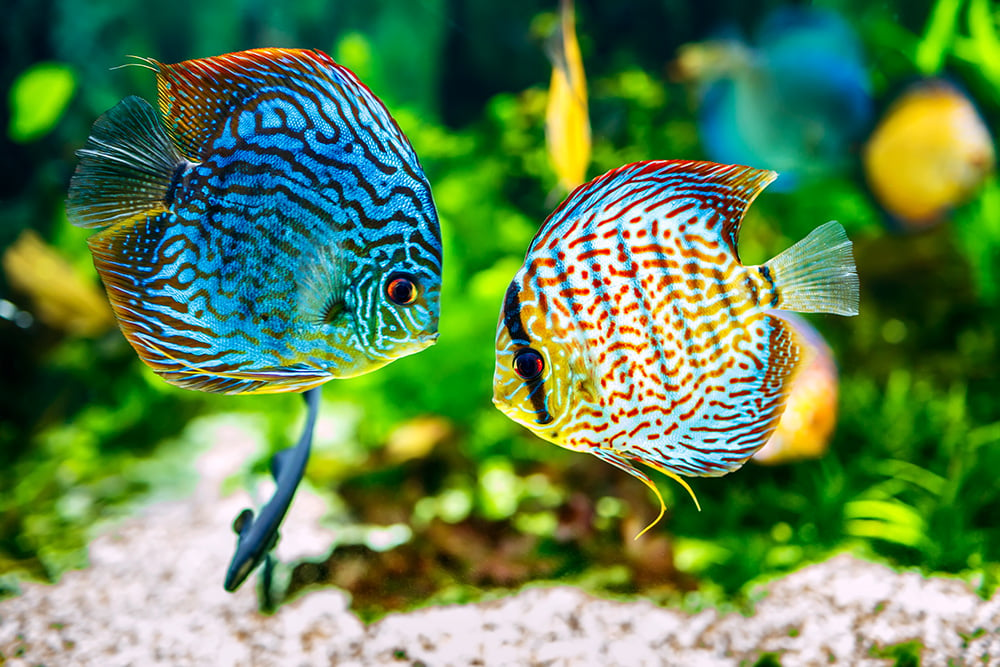
Learn how to care for discus fish with this complete, conversational guide. Discover the best tank size, setup, compatible mates, lifespan, feeding tips, and how to keep your discus thriving like “kings of the tank.”
If I’m honest, the first time I saw discus fish, I felt like I’d spotted royalty gliding through water. Their elegant, round bodies and rich patterns almost demand your attention. But here’s the truth: caring for discus is like nurturing a delicate friendship—it takes attention, patience, and a little empathy.
Quick answer: Discus fish are stunning, gentle, and rewarding—but they need warm water, a spacious tank, and steady care to thrive.
Understanding Discus Fish
Discus Fish Size
These fish typically grow 4½–8 inches in ideal conditions, though most common aquarium specimens hit around 5–7 inches.
Quick answer: Discus fish generally reach 5–7 inches, though they can grow larger under top care.
Discus Fish Lifespan
In well-maintained home aquariums, discus often live 10 years, and occasionally up to 15 years with top-notch care.
Quick answer: With steady care, discus can live 10–15 years—a lifelong companionship.
Setting Up the Ideal Discus Tank
Discus Fish Tank Size
Aim for 75+ gallons for a small group to provide enough space and water stability. A 55-gallon tank can work for fewer fish—but expect frequent water changes. A simple rule: one adult discus per 10 gallons.
Quick answer: Start with at least 75 gallons, or one fish per 10 gallons, for stable discus care.
Tank Setup Essentials
Discus hail from slow-moving Amazon waters, so set up your tank accordingly:
-
Substrate: Sand or bare bottom works best for easy cleaning.
-
Decor: Driftwood, vertical plants, and shaded areas mimic their natural habitat.
-
Plants: Use heat- and low-light-tolerant species like Anubias, Java Fern, Bacopa, and Amazon Swords.
Quick answer: Use sand or bare bottom, hardy plants, driftwood, and gentle decor for a calm, natural discus home.
Water Temperature and Conditions
Discus thrive in warm water—84–86°F is ideal; some even elevate to 88°F to boost metabolism and color.
Recommended water parameters:
-
pH: Aim for 6.0–7.0, though up to 7.5 can work.
-
Hardness: Soft water—1–4 dKH (18–70 ppm)—is best.
Quick answer: Maintain water at 84–86°F, pH 6.0–7.0, and soft hardness for happy discus.
Filtration & Maintenance
Discus need clean, stable water. Use efficient filtration—canister filters are ideal with biological, mechanical, and chemical media.
Water changes are key:
-
Weekly 20–25% changes for planted tanks.
-
In heavy stocking, 50%+ twice a week may be needed.
Quick answer: Use a reliable canister filter and commit to regular, substantial water changes to keep conditions top-tier.
Choosing Discus Tank Mates
Discus are peaceful but slow eaters and schoolers. Good tank mates should share similar heat and water needs:
Recommended companions:
-
Cardinal tetras, neon tetras
-
Sterbai corydoras
-
Rams or dwarf cichlids (e.g., Apistogramma).
Avoid fast or large fish that outcompete discus for food.
Quick answer: Pair them with peaceful, heat-tolerant fish like cardinals or corys—no fast feeders or big aggressive species.
Feeding Your Discus
Discus are omnivores with small mouths—offer a varied menu:
-
High-quality flakes, granules, spirulina, shrimp pellets – I like these Spirulina Flakes and also these Vibra Bites.
-
Frozen/live options: brine shrimp, blackworms, bloodworms.
Feed small portions once or twice daily, letting them eat in 2–3 minutes.
Don’t rely on overly rich meaty feeds—they upset digestion.
Quick answer: Feed a varied diet of flakes, granules, and frozen treats in small servings once or twice a day.
Tank Maintenance & Common Issues
Discus are sensitive to stress. Reduce traffic, mute background noise, and avoid tapping the glass.
Watch for color loss—it can signal stress, poor water, or bullying.
Quick answer: Keep water clean, quiet, and stress-free—any sudden color change can mean trouble.
Breeding & Behavior Highlights
Discus are social and exhibit remarkable parental care. If we are talking about how to care for discus fish than we have to mention that they just don’t do as well by themselves:
-
They school naturally—it’s best to have at least six individuals.
-
Parents feed fry with skin mucus (“discus milk”)—a rare and fascinating behavior.
Quick answer: Keep discus in groups if possible—they show social, nurturing behaviors with beautiful insights into fish parenting.
Common Questions (FAQ)
What size tank do discus need?
At least 75 gallons, or follow one fish per 10 gallons rule.
How warm should the water be?
Keep it between 84–86°F for vibrant discus.
How long do they live?
With quality care, they can live 10–15 years.
What tank mates work well?
Cardinal tetras, Sterbai corys, and dwarf cichlids—avoid fast eaters.
My Real-Life Tips for Success
When I first set up my discus tank, I underestimated how sensitive they are to change. I found noise stressful them out—so I moved the tank away from the TV and limited foot traffic nearby. Their colors popped within days.
Another insight: feeding variety matters. I mix pellets with blackworms and spirulina flakes to keep them curious and colorful.
Lastly, schooling matters. A lone discus looked lost. Once I added five more, they spread out, looked relaxed, and the tank felt complete.
Conclusion – Making Discus a Rewarding Choice
Once you have learned how to care for your discus fish, you will see they are like hosting elegance in your living room. With the right tank size, warm and soft water, patient feeding, and regular maintenance, you’ll enjoy their graceful presence—and the reward of a peaceful underwater kingdom.
If you want to turn your tank into a discus haven, gentle attention and stable conditions are your keys. It’s not just fishkeeping—it’s creating a living artwork.
